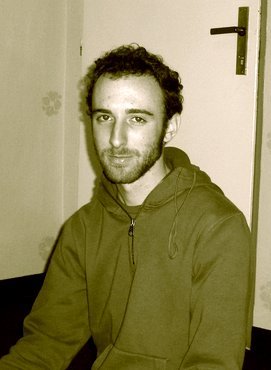Hot and Spicy in Sichuan
Since I last wrote, I have spent the last of my full days in Chengdu and the surrounding area. After I arrived, I took a two-hour bus to Leshan, site of the world's largest carved Buddha at more than 20 stories tall. Luckily, I encountered two Israelis during the eighth month of their Southeast Asian romp, so I spent the day exchanging stories with friendly strangers rather than becoming bored by my own thoughts. Perhaps the strangest aspect of the site was the lack of Chinese tourists. It was actually possible to take pictures around the Buddha, and I only had to pose for a few pictures with the Chinese tourists. Normally, the place would have been packed beyond belief, but tourism in the area has been severely depressed since the earthquake, up to 90% off last year's levels, I am told. Certainly this will not help the area recover quickly, but it does make for nice vacationing.
Ride that tiger:
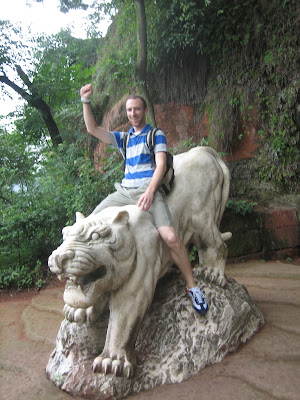
Big Buddha, Big Buddha, Big Buddha Big Buddha Big Buddha:


The girls with whom I'm couchsurfing had invited 1-2 more surfers to stay at their place while I was there, and they arrived later that night. This proved to be a fortunate development, as it provided me with travel companions for the ensuing few days.
Jordan, from Arizona, went with me to view the Panda Research Centre outside of Chengdu the next day. Unfortunately, many of the pandas have been moved to Beijing as a result of the earthquake, so we only saw about 15 total pandas, as well as preserved parts of dead pandas. Truthfully, I don't understand how pandas are not yet extinct. They sleep for about 21 hours per day, making them incredibly vulnerable to attack; they essentially only eat one kind of vegetation, meaning that they are incredibly dependent upon only the most ideal living conditions; they aren't sexually mature until they're around 6 years old, meaning that there's a significant chance they won't even survive to reproduce; if they do survive that long, they don't seem that interested in mating during the 3 hours a day they're lucid, so much so that zoologists often have to show panda porn in order to get them interested in one another; they normally only raise one offspring, leaving the others to die; and they often decide to kill and eat this offspring if they don't like it or want to raise it. With 1000 or so left in the wild (meaning nature reserve in remote Sichuan), don't expect them to ever fully recover.
Just munchin':

I'm pretty sure this quotation didn't originally refer to pandas:

Reproductive organs:
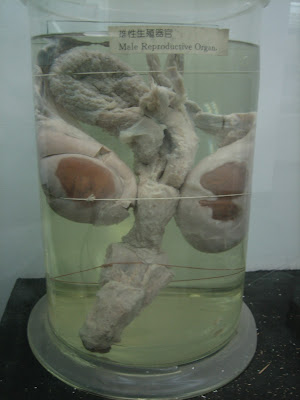
Rare shots of pandas willingly mating:

A museum exhibit in the panda museum about other museums (you might even say, a meta-museum):
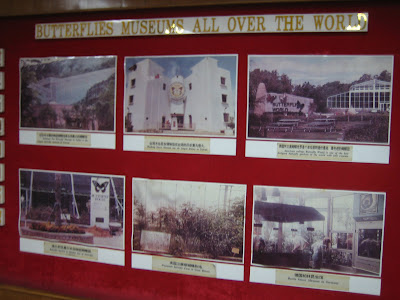
After getting back from the panda reserve before noon, since they've all passed out from bamboo ecstasy by 11, Jordan and I made our way to the central square, dominated by an enormous Mao statue, and then continued on to People's Park to relax in one of the teahouses made famous by Sichuanese dwellers. If I were to move back to China, I would not consider living anywhere other than the provinces of Yunnan, Sichuan, or Guangxi in the south. The life here just seems so much more relaxed. Locals young and old spend hours chatting and playing cards and mazhong with one another, with nothing more than a $0.60 cup of tea required, and I don't think they're bothered at all by the decrease in productivity.
The next day we ventured to the Sichuan Science and Nature Museum that we had noticed behind the giant Mao statue, and it was glorious. Just like its equivalent in Chicago, it featured decades-old computers and exhibits. Unfortunately, they also had toys that apparently weren't suitable for grown-ups, as another couchsurfing friend, Thomas, decided to stick his finger in one of the apparatuses, which promptly resulted in a fractured finger that had to be numbed by tubs of ice cream until he eventually made his way to the hospital. Jordan and I continued on to the Tibetan area of the city (parts of Sichuan and Yunnan were previously considered Tibet before China gained control of Tibet in the mid-twentieth century, so that current political lines do not accurately incorporate Tibetan areas in Tibet with those in other adjoining provinces) to look for some of the food that had been so delicious when Tyler and I traveled to Yunnan. Unfortunately, no yak cheese dumplings were to be found, though I suppose the yak meat was tasty enough for the trip to have been worth the effort.
Mao in front of the museum:
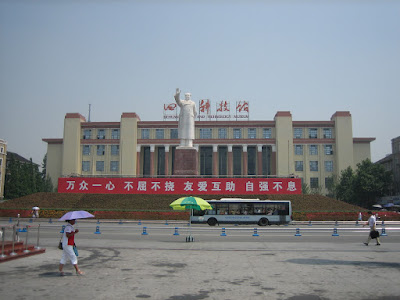
Inside the museum (notice the UFO on the right):
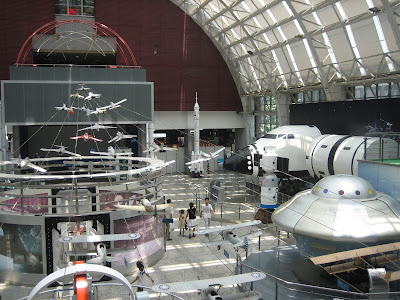
Tea house:
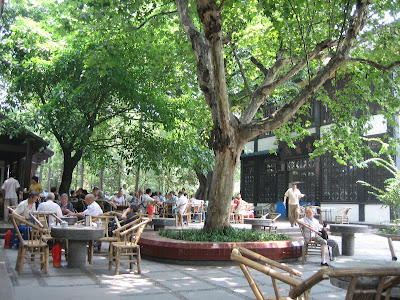
Gross 1000-year old egg:
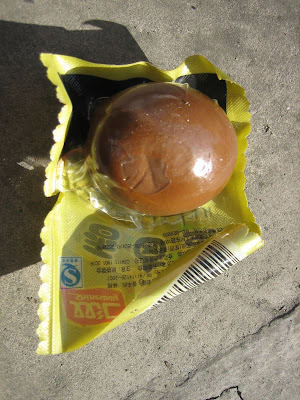
NICE!
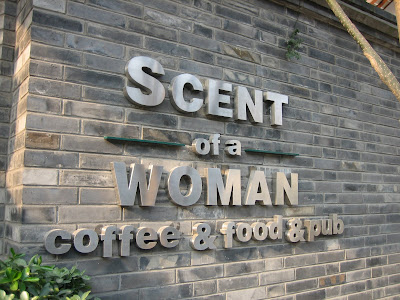
As I wrote in my initial post this year, I planned to spend some time on this trip in areas affected by the earthquake. As I anticipated to some degree, this has proved difficult. The government, understandably, does not want foreigners to circumvent its control. Pictures of areas that have not yet been adequately responded to, and pictures of foreigners providing support instead of the government, are to be particularly avoided, I imagine. This, along with the more-than-sufficient manpower enabled by a country of 1.3 billion people, meant that I certainly wouldn't be hoisting bricks or painting newly built walls. I thought my year as a teacher might be of some use, and indeed I had lined up a gig teaching for about a week in a rural township, only to have those plans fall through. I had also found a foreign organization needing help putting together medical kits, but that project was dependent upon the supplies arriving in a timely manner, and this did not happen at a time when I was free. Fortunately, an organization formed by expats after the earthquake has been traveling to a more remote, devastated village each Sunday simply to provide a break for the kids and families. I was invited to accompany them this Sunday, and I assumed I'd be teaching some English classes to the schoolchildren. This, along with song and dance, crafts, recreation and sports, and preschool, form the groups the organization plans each week to support the kids. After it was discovered that I had spent time in Nashville, though, I was quickly placed on the song and dance team to teach some line dances and see if I could get some boys interested in that activity. I thought about some of the different moves involved in line dances, and even some that normally aren't (per Tyler at the Wild Horse), but ultimately I sort of just made them up on the spot when we arrived in Loushui. Never have I been so tired after only half an hour! Russian leg-kicks, hops, slides, steps, spins, heel kicks, twists, and turns in sunny 90-degree heat can really take it out of you. When we first arrived at the village, I was concerned that our presence was a bit self-indulgent and unhelpful to the community, as locals stared at our bus and police refused to let us enter. But after some wrangling with the authorities and spending a few hours with the kids, I know that they were glad to have us there. The town is pretty devastated, with people living in tents and few buildings safe to inhabit or enter, but it has seen a pronounced increase in local commerce this past week, according to some of the more consistent volunteers, so hopefully that is a sign that life is beginning to return to normalcy.
Playing games with the kiddies:

Standing in rubble:
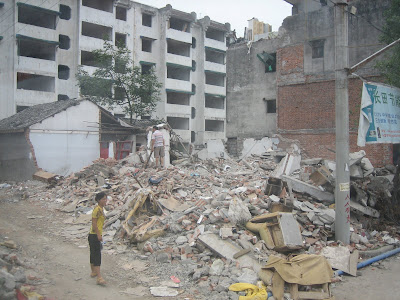
Temporary housing for the army and relief workers:
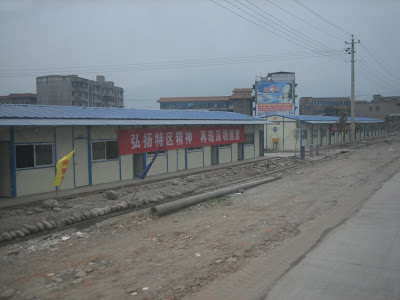
Today, I made my way to Huanglongxi, one of the sites used for the filming of "Crouching Tiger, Hidden Dragon". It was a fairly touristy Chinese site, but I did sit for three hours in a tea house and read through most of one of the books I brought. I was also reminded again of why I hate minibuses. I took one this morning without much trouble, though the 90 minutes it took to travel 40 kilometers were a bit excessive. As I departed the bus, I was told by the attendant that the bus would be leaving at 3:00. I made it back to the bus by around 2:30 and ate a quick lunch, and I was on board by 3:00. Well, 3:00 doesn't mean 3:00 in China, but rather "whenever the bus is full of people and live chicken after 3:00, or, more precisely, 3:50. This wasn't too bad, since I was just having a relaxing Sichuanese day and wasn't feeling rushed, and the bus would be taking me directly to a bus station right on one of the local Chengdu bus routes back to the apartment I'm staying in. Well, I dozed off on the bus, only to be awakened by some yelling that we had arrived at the stop, when in reality, we had arrived a few blocks away and the bus wanted to continue on a different route. If I hadn't woken up then, who knows where I would have ended up. And if I couldn't speak Chinese, I never would have known that the plans were changing in the first place. Oh, China.
Huanglongxi:
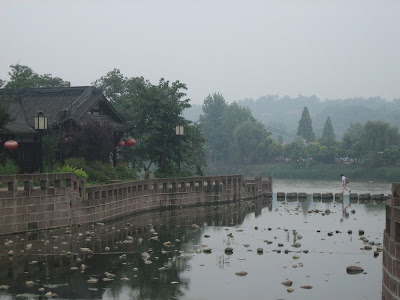
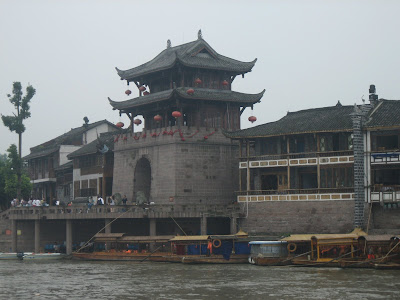
Tomorrow, I head to the last frontier in China, also known as Xinjiang. It's mostly desert, so I'll just continue sweating from sun-up until sun-up.
Where I buy all of my underwear in Chengdu:
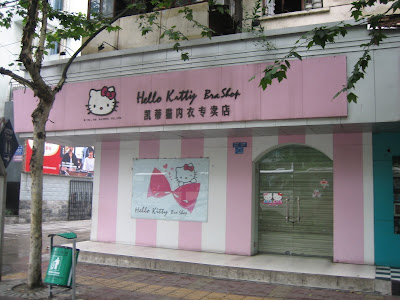
Ride that tiger:

Big Buddha, Big Buddha, Big Buddha Big Buddha Big Buddha:


The girls with whom I'm couchsurfing had invited 1-2 more surfers to stay at their place while I was there, and they arrived later that night. This proved to be a fortunate development, as it provided me with travel companions for the ensuing few days.
Jordan, from Arizona, went with me to view the Panda Research Centre outside of Chengdu the next day. Unfortunately, many of the pandas have been moved to Beijing as a result of the earthquake, so we only saw about 15 total pandas, as well as preserved parts of dead pandas. Truthfully, I don't understand how pandas are not yet extinct. They sleep for about 21 hours per day, making them incredibly vulnerable to attack; they essentially only eat one kind of vegetation, meaning that they are incredibly dependent upon only the most ideal living conditions; they aren't sexually mature until they're around 6 years old, meaning that there's a significant chance they won't even survive to reproduce; if they do survive that long, they don't seem that interested in mating during the 3 hours a day they're lucid, so much so that zoologists often have to show panda porn in order to get them interested in one another; they normally only raise one offspring, leaving the others to die; and they often decide to kill and eat this offspring if they don't like it or want to raise it. With 1000 or so left in the wild (meaning nature reserve in remote Sichuan), don't expect them to ever fully recover.
Just munchin':

I'm pretty sure this quotation didn't originally refer to pandas:

Reproductive organs:

Rare shots of pandas willingly mating:

A museum exhibit in the panda museum about other museums (you might even say, a meta-museum):

After getting back from the panda reserve before noon, since they've all passed out from bamboo ecstasy by 11, Jordan and I made our way to the central square, dominated by an enormous Mao statue, and then continued on to People's Park to relax in one of the teahouses made famous by Sichuanese dwellers. If I were to move back to China, I would not consider living anywhere other than the provinces of Yunnan, Sichuan, or Guangxi in the south. The life here just seems so much more relaxed. Locals young and old spend hours chatting and playing cards and mazhong with one another, with nothing more than a $0.60 cup of tea required, and I don't think they're bothered at all by the decrease in productivity.
The next day we ventured to the Sichuan Science and Nature Museum that we had noticed behind the giant Mao statue, and it was glorious. Just like its equivalent in Chicago, it featured decades-old computers and exhibits. Unfortunately, they also had toys that apparently weren't suitable for grown-ups, as another couchsurfing friend, Thomas, decided to stick his finger in one of the apparatuses, which promptly resulted in a fractured finger that had to be numbed by tubs of ice cream until he eventually made his way to the hospital. Jordan and I continued on to the Tibetan area of the city (parts of Sichuan and Yunnan were previously considered Tibet before China gained control of Tibet in the mid-twentieth century, so that current political lines do not accurately incorporate Tibetan areas in Tibet with those in other adjoining provinces) to look for some of the food that had been so delicious when Tyler and I traveled to Yunnan. Unfortunately, no yak cheese dumplings were to be found, though I suppose the yak meat was tasty enough for the trip to have been worth the effort.
Mao in front of the museum:

Inside the museum (notice the UFO on the right):

Tea house:

Gross 1000-year old egg:

NICE!

As I wrote in my initial post this year, I planned to spend some time on this trip in areas affected by the earthquake. As I anticipated to some degree, this has proved difficult. The government, understandably, does not want foreigners to circumvent its control. Pictures of areas that have not yet been adequately responded to, and pictures of foreigners providing support instead of the government, are to be particularly avoided, I imagine. This, along with the more-than-sufficient manpower enabled by a country of 1.3 billion people, meant that I certainly wouldn't be hoisting bricks or painting newly built walls. I thought my year as a teacher might be of some use, and indeed I had lined up a gig teaching for about a week in a rural township, only to have those plans fall through. I had also found a foreign organization needing help putting together medical kits, but that project was dependent upon the supplies arriving in a timely manner, and this did not happen at a time when I was free. Fortunately, an organization formed by expats after the earthquake has been traveling to a more remote, devastated village each Sunday simply to provide a break for the kids and families. I was invited to accompany them this Sunday, and I assumed I'd be teaching some English classes to the schoolchildren. This, along with song and dance, crafts, recreation and sports, and preschool, form the groups the organization plans each week to support the kids. After it was discovered that I had spent time in Nashville, though, I was quickly placed on the song and dance team to teach some line dances and see if I could get some boys interested in that activity. I thought about some of the different moves involved in line dances, and even some that normally aren't (per Tyler at the Wild Horse), but ultimately I sort of just made them up on the spot when we arrived in Loushui. Never have I been so tired after only half an hour! Russian leg-kicks, hops, slides, steps, spins, heel kicks, twists, and turns in sunny 90-degree heat can really take it out of you. When we first arrived at the village, I was concerned that our presence was a bit self-indulgent and unhelpful to the community, as locals stared at our bus and police refused to let us enter. But after some wrangling with the authorities and spending a few hours with the kids, I know that they were glad to have us there. The town is pretty devastated, with people living in tents and few buildings safe to inhabit or enter, but it has seen a pronounced increase in local commerce this past week, according to some of the more consistent volunteers, so hopefully that is a sign that life is beginning to return to normalcy.
Playing games with the kiddies:

Standing in rubble:

Temporary housing for the army and relief workers:

Today, I made my way to Huanglongxi, one of the sites used for the filming of "Crouching Tiger, Hidden Dragon". It was a fairly touristy Chinese site, but I did sit for three hours in a tea house and read through most of one of the books I brought. I was also reminded again of why I hate minibuses. I took one this morning without much trouble, though the 90 minutes it took to travel 40 kilometers were a bit excessive. As I departed the bus, I was told by the attendant that the bus would be leaving at 3:00. I made it back to the bus by around 2:30 and ate a quick lunch, and I was on board by 3:00. Well, 3:00 doesn't mean 3:00 in China, but rather "whenever the bus is full of people and live chicken after 3:00, or, more precisely, 3:50. This wasn't too bad, since I was just having a relaxing Sichuanese day and wasn't feeling rushed, and the bus would be taking me directly to a bus station right on one of the local Chengdu bus routes back to the apartment I'm staying in. Well, I dozed off on the bus, only to be awakened by some yelling that we had arrived at the stop, when in reality, we had arrived a few blocks away and the bus wanted to continue on a different route. If I hadn't woken up then, who knows where I would have ended up. And if I couldn't speak Chinese, I never would have known that the plans were changing in the first place. Oh, China.
Huanglongxi:


Tomorrow, I head to the last frontier in China, also known as Xinjiang. It's mostly desert, so I'll just continue sweating from sun-up until sun-up.
Where I buy all of my underwear in Chengdu:




